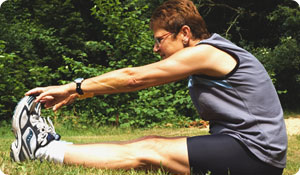
If you've ever had a muscle cramp or charley horse, you know how painful they are. They're unpredictable and tend to strike during sleep, exercise, or when you've held one position for too long. But what causes muscle cramps, and how can they be avoided?
What Are Muscle Cramps?
Muscle cramps are caused by sudden, involuntary contraction of one or more muscles. Sometimes they just cause a twitch or slight spasm. But when they don't release on their own or contract too tightly, they cause painful muscle cramps.
According to the American Academy of Orthopedic Surgeons, muscle cramps can happen to any skeletal muscle, but are most common in the legs and feet and muscles that cross two joints (such as the calf muscle.) Cramps can involve part of a muscle or all the muscles in a group. The most commonly affected muscle groups are:
- Back of lower leg/calf
- Back of thigh (hamstrings)
- Front of thigh (quadriceps)
- Feet, hands, arms, abdomen
What Causes Them?
According to the Mayo Clinic, the exact cause of muscle cramps is still unknown, but the theories most commonly cited include:
- Altered neuromuscular control
- Dehydration
- Electrolyte depletion
- Poor conditioning
- Muscle fatigue
- Doing a new activity
Cramps are common to athletes starting training or pre-season and those exercising in extreme heat or for prolonged periods of time. It's thought that dehydration and reduction of electrolytes including potassium and sodium can cause the muscles to receive the wrong messages from nerves, which lead to involuntary contractions. The Mayo Clinic says other causes for cramping are:
- Inadequate blood supply. Narrowing of the arteries that deliver blood to your legs.
- Nerve compression. Compression of nerves in your spine
- Mineral depletion. Too little potassium, calcium or magnesium in your diet can contribute to leg cramps. Some diuretic medications prescribed for high blood pressure cause loss of potassium.
- Certain medical conditions such as nerve, kidney, thyroid or hormone disorders, diabetes, hypoglycemia and anemia.
How Do You Treat a Muscle Cramp?
As soon as you feel the muscle tightening, stop, stretch and massage. For example, if your calf cramps, stop exercising, flex your toes, and manually stretch the muscle back out or put your weight on your cramped leg and bend your knee slightly.
- Apply heat to tense muscles and ice to reduce pain.
- Take ibuprofen or another nonsteroidal anti-inflammatory medication to reduce inflammation and pain.
- Drink plenty of fluids.
Most muscle cramps need no further treatment and will relax within a few minutes. The muscle may feel tender for a few days. If the spasm won't release on its own or pain is severe or debilitating, contact your doctor. Physical therapy and certain prescription medications are effective for prolonged or chronic muscle cramps.
How Do You Prevent Them?
- Drink plenty of fluids before, during and after exercise. Muscles work best when they're well hydrated.
- Consider sports drinks if you exercise for a prolonged period of time, under extreme conditions or during hot weather.
- Stretch warm muscles. Start with five to ten minutes of warm up exercises (like walking) then stretch your muscles. Stretch again after you exercise or play sports.
- Stretch before bedtime if you're prone to cramps during sleep.
- Cross train and exercise regularly-the stronger your muscles are, the more efficiently they'll work.
- Eat a balanced diet.
Source:
MedlinePlus
Charley horse
http://www.nlm.nih.gov/medlineplus/ency/article/002066.htm





